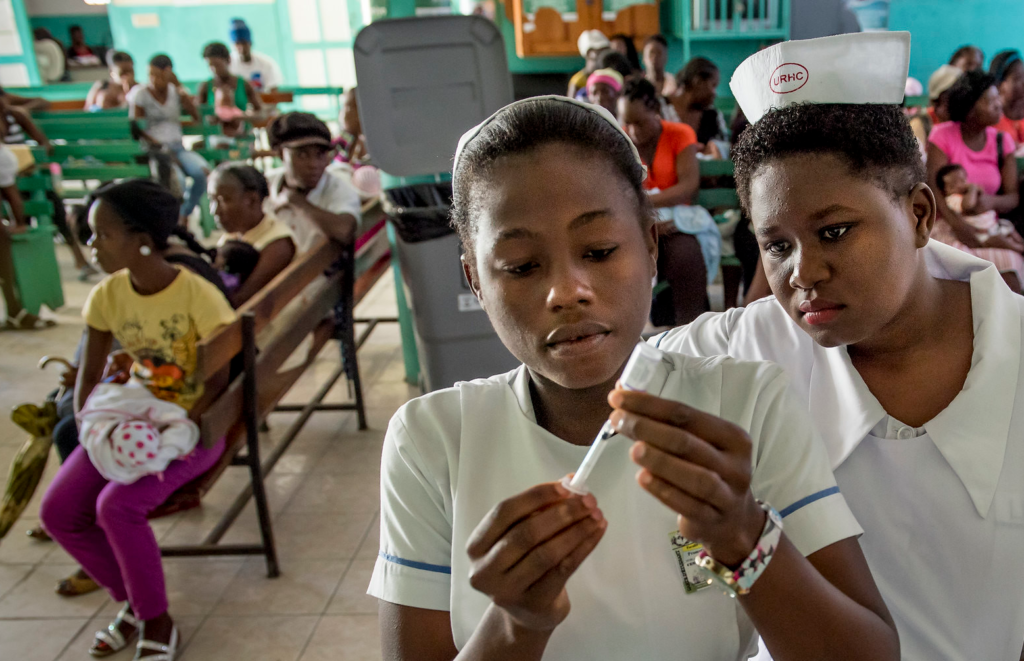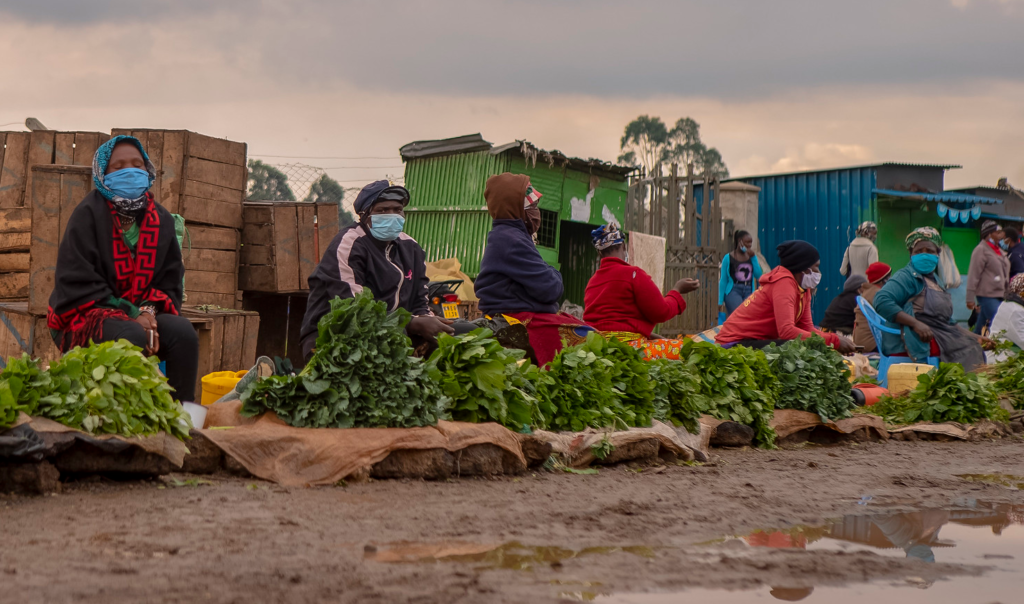Lessons from the COVID-19 Vaccine Rollout
What can the vaccine rollout process teach the family planning and reproductive health community?

A conversation with Dr. Otto Chabikuli, FHI 360’s Director of Global Health, Population and Nutrition, included important lessons from the COVID-19 vaccine rollout. Dr. Chabikuli discussed contributing factors—from lack of funding and manufacturing capacity to political will and vaccine acceptance—that have affected vaccination rates worldwide; how those same factors apply to family planning and reproductive health; and how other vaccine campaign approaches are relevant.
The global rollout of the COVID-19 vaccines, like the outbreak of the pandemic itself, is of indisputable significance to the provision of family planning and reproductive health services. In less than one year from the World Health Organization (WHO)’s declaration of a global pandemic—a record time for any vaccine—the rollout of COVID-19 vaccines commenced.
Despite this spectacular achievement and the stated commitment to global action, the rollout so far has been uneven, with some regions far ahead of others. Our World in Data shows massive regional differences in the proportion of the population that is fully vaccinated: More than 27% in North America, 20% in Europe, 10% in South America, 2.5% in Asia, and 0.81% in Africa (from “Coronavirus (COVID-19) Vaccinations,” retrieved June 10, 2021).
What Drives the Difference?

Portrait of Dr. Otto Chabikuli (via FHI 360)
Dr. Otto Chabikuli, Director of Global Health, Population and Nutrition at FHI 360, has been immersed in the COVID vaccine rollout, and spoke with Knowledge SUCCESS about what is behind these regional differences. Dr. Chabikuli notes that a complex combination of factors—including lack of funding, limited global manufacturing capacity, weak political commitment, the state of pandemic preparedness, logistic and supply chain capacity, and vaccine acceptance and hesitancy—contributes to differences in rollout performance, which offer vital lessons for the family planning and reproductive health community.
“Since there is a limited pool of resources, countries will unavoidably shift critical resources needed for a successful mass vaccination campaign—especially health-care workers and logistics and supply chain [resources]— away from basic services deemed non-urgent, such as Primary Health Care and family planning/reproductive health,” says Dr. Chabikuli. This would occur against a backdrop of an estimated 49 million women who already may have unmet need for contraception due to COVID-19 response-related challenges, leading to an additional 15 million unintended pregnancies according to data published by the Guttmacher Institute. Given that we know vaccination will be a multiyear effort, Dr. Chabikuli predicts that the cumulative cost of continued disruption of basic services over many years will be unacceptably high if it is not mitigated.
“Knowing in advance that resources will be shifted to support vaccine rollout and basic services may be disrupted, countries should incorporate proactively mitigation measures to protect the most vulnerable,” Dr Chabikuli advises. “It is important that we adopt an integrated planning of resources from the beginning to limit or minimize disruption of vital family planning/reproductive health services as resources are urgently mobilized and dedicated to COVID-19 vaccine rollout.” A timely revision of policies and guidelines to include mitigation interventions, as appropriate—such as dispensing several months’ worth of family planning commodities to reduce the need for patients to the clinics for refills and delivering services, consultations, and education online—is important to such mitigation efforts.
Impact on Manufacturing
The COVID-19 vaccines rollout has affected the manufacture of vital family planning commodities. Although manufacturers have committed to maintaining production levels for contraceptives, the limited global manufacturing capacity and raw materials for COVID-19 vaccines threatens the ability of pharmaceutical companies like Pfizer to meet their contractual obligations of 2 billion doses by the end of 2021. Dr. Chabikuli says that the potential revenue loss from defaulting on the COVID-19 contract is significant and that efforts to avoid that loss could affect family planning supplies. For example, Pfizer has made a business decision to stop manufacturing Depo Provera, the most commonly used injectable contraceptive in low- and medium-income countries (LMICs), until 2022. “This will negatively impact stock security of this contraceptive method in developing countries,” warns Dr. Chabikuli.
Tackling Inequalities
Very early in the pandemic, data emerged showing that COVID-19 exacerbates pre-existing inequalities in society. One study by McKinsey & Company established that COVID-19 does not create new inequalities but rather exacerbates existing, known inequalities (such as rural vs urban and formal vs informal settlement inequalities) in access to health services. Dr. Chabikuli says that matters were not helped by the fact that stakeholders did not adjust for pre-existing inequalities when planning for the overall COVID-19 response. Inequalities that affect workers in high-risk, consumer-facing industries of LMICs—health care, teaching, childcare, hospitality services, and sales in crowded markets—disproportionately fall on women of reproductive age. “Increased unemployment and subsequent economic vulnerability among women add to the many barriers that they face when seeking family planning/reproductive health services in LMICs. It may be useful to include beneficiary representatives such as women in the planning and rollout teams,” Dr. Chabikuli counsels.

Messaging and Misconceptions
The rollout of COVID-19 vaccines has also witnessed gaps in messaging and communication, fuelling myths and misconceptions leading to vaccine hesitancy. The fact that pharmaceutical companies sought and received waivers from liability arising from vaccine side effects fueled suspicion that the scientific process would be rushed and safety concerns downplayed. Vaccination hesitancy—the delay in acceptance or refusal of vaccines, despite the availability of vaccine services—is influenced by factors such as complacency, convenience, and confidence. The same factors affect family planning: service providers have to contend with myths and misconceptions about contraceptives. Dr. Chabikuli advises that science must take center stage in family planning and reproductive health messaging and communication, and practitioners must be deliberate and consistent in giving out information and countering misinformation. For example, he expounds, the frequent, almost daily, appearance of scientific authorities (such as U.S. top infectious diseases scientist, Prof. Anthony Fauci) in the media to field questions about, explain the science behind, and defend the rigor of the vaccine creation process was critical in countering COVID-19 vaccine misinformation.
Taking a Leaf from Childhood Vaccination Campaigns
Dr. Chabikuli explains that there are technical and programmatic approaches from the WHO’s Expanded Program on Immunization (EPI) that can offer insight. He acknowledges the significant differences in the beneficiary populations of EPI (children under 5 years of age) versus the COVID-19 vaccine rollout (adults) and family planning/reproductive health (primarily women of reproductive age), which may make direct comparison difficult. However, Dr. Chabikuli explains that some of EPI’s approaches can be applied to other programs:
- Microplanning (a process to ensure that services reach every community by identifying priority communities, addressing community-specific barriers, and developing workplans with solutions at the community level);
- Use of data to guide management decisions, especially forecasting for family planning commodities and preventing stockouts;
- Community engagement to support buy-in and ownership; and
- Advocacy and stakeholder management.
These EPI approaches can be adopted in areas such as Gulu, northern Uganda, where use of contraceptives faces stiff resistance. Chabikuli observes that these approaches used in childhood immunization are extraordinarily powerful; for example, WHO-sponsored polio vaccination campaigns managed to convince warring parties in the Democratic Republic of the Congo (in 1999), Afghanistan (in 2001), and Syria (in 2013), to observe cease-fires for the duration of vaccination campaigns.
The outbreak of the COVID-19 pandemic was unprecedented. It exposed significant gaps and opportunities in family planning and reproductive health programming. And now, it is clear, the rollout of the vaccines is providing equally significant lessons for family planning and reproductive health practitioners.





